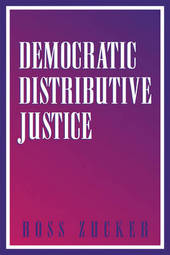
|
Democratic Distributive Justice
Paperback / softback
Main Details
| Title |
Democratic Distributive Justice
|
| Authors and Contributors |
By (author) Ross Zucker
|
| Physical Properties |
| Format:Paperback / softback | | Pages:348 | | Dimensions(mm): Height 229,Width 152 |
|
| Category/Genre | Social and political philosophy
Economic theory and philosophy |
|---|
| ISBN/Barcode |
9780521533553
|
| Classifications | Dewey:320.011 |
|---|
| Audience | | Professional & Vocational | |
|---|
| Illustrations |
6 Tables, unspecified
|
|
Publishing Details |
| Publisher |
Cambridge University Press
|
| Imprint |
Cambridge University Press
|
| Publication Date |
14 July 2003 |
| Publication Country |
United Kingdom
|
Description
By exploring the integral relationship between democracy and economic justice, Democratic Distributive Justice seeks to explain how democratic countries with market systems should deal with the problem of high levels of income-inequality. The book acts as a guide for dealing with this issue by providing an interdisciplinary approach that combines political, economic, and legal theory. It also analyzes the nature of economic society and puts forth a new understanding of the agents and considerations bearing upon the ethics of relative pay, such as the nature of individual contributions and the extent of community in capital based market systems. Economic justice is then integrated with democratic theory, yielding what Ross Zucker calls 'democratic distributive justice'. While prevailing theory defines democracy in terms of the electoral mechanism, the author holds that the principles of distribution form part of the very definition of democracy, which makes just distribution a requirement of democratic government.
Reviews'Democratic Distributive Justice is a most impressive work that demonstrates unusual originality and creativity, not to say considerable courage. His ... carefully crafted argument challenges a broad range of philosophical and ideological perspectives. At the same time, however, his presentation is always measured in tone, carefully reasoned, and persuasive. Provocative it may be, but it is too well argued to be ignored or dismissed. We have needed such a work. If it achieves the success it deserves, in a few years Ross Zucker will be known as one among the important contemporary scholars who have contributed significantly to our understanding of democracy, equality, property, and justice.' Robert Dahl, Yale University 'Ross Zucker has written a ... thought-provoking book on the relationship between income distribution, rights, and democratic community. In it, he offers a powerful argument for a more egalitarian distribution of income. He also offers numerous penetrating observations on popular and influential theories of distribution, indicating clearly how they relate to his own. This is a rewarding and challenging book both for those who find themselves convinced by its central argument and those who remain sceptical.' David P. Levine, University of Denver 'Ross Zucker offers a ... social-relations approach to the distribution of property within a framework of democratic justice. As a social relations account of property, it seems to me the best of its kind. Zucker also inventively links the distribution of property and the theory of democracy. His arguments are deployed with a striking command of the literature in philosophy, economics, and political theory.' Stephen R. Munzer, UCLA School of Law 'This thoughtful and highly original book addresses an important issue in political philosophy - the question of what principles underlie a just distribution of income and wealth. Ross Zucker argues the intrinsically interdependent character of economic activity establishes a principles of distributive justice that entitles every participant in the economy to an equal share of part of the income and wealth generated by that activity. Zucker builds his novel case for egalitarianism on careful logic, against the background off a first-rate critical survey of the philosophical literature on property rights from Locke to Rawls. This book should spark a lively debate on a topic that, in this age of widening inequality, is more relevant than perhaps ever before.' Gary Mongiovi, Coeditor, Review of Political Economy 'This book should be required reading for anyone, regardless of ideological perspective, who wishes to obtain a comprehensive understanding of capitalism in modern democracy.' Choice '... a challenging contribution to contemporary political and economic theory.' Political Studies 'The book is erudite, closely reasoned and tightly written, and its tone engaged and serious ... Zucker's thesis deserves widespread attention both for its tight and comprehensive character and for its substantive importance at a time of widening inequalities in market economies.' Contemporary Political Theory
|